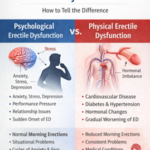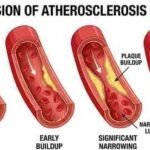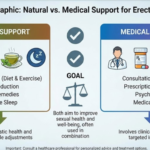Erectile Dysfunction affects millions of men worldwide, with studies showing it impacts nearly 30 million men in the United Kingdom alone. Sildenafil, the active ingredient in Viagra uk, has revolutionized ED Treatment since its introduction in 1998. This comprehensive guide explains how sildenafil effectively treats erectile dysfunction, proper dosing protocols, safety considerations, and what patients can expect from treatment.
Understanding How Sildenafil Works
Sildenafil uk belongs to a group of medicines called phosphodiesterase 5 (PDE5) inhibitors. These medicines prevent an enzyme called phosphodiesterase type-5 from working too quickly. The penis is one of the areas where this enzyme works.
When a man becomes sexually aroused, the body releases nitric oxide in the penis, which triggers the production of cyclic guanosine monophosphate (cGMP). This chemical relaxes smooth muscle cells in blood vessels, allowing increased blood flow to the penis. However, the PDE5 enzyme quickly breaks down cGMP, reducing blood flow and ending the erection.
Sildenafil in United kingdom works by blocking the PDE5 enzyme, allowing cGMP levels to remain elevated longer. This maintains the relaxed state of blood vessels and sustains adequate blood flow for achieving and maintaining an erection during sexual stimulation. Importantly, sildenafil only works when sexual arousal is present, as it requires the natural release of nitric oxide to be effective.
Proper Dosage and Administration
Starting Dosage
The recommended dosage of Viagra for erectile dysfunction is 50 mg, taken as needed about 1 hour before sexual activity. You can take it 30 minutes to 4 hours before sexual activity. And you shouldn’t take more than one dose per day.
The standard approach to sildenafil dosing follows this protocol:
Starting Dose: Most men begin with 50mg taken approximately one hour before planned sexual activity. Taken around 60 minutes before sex it helps men with erectile dysfunction get and keep an erection.
Timing: Viagra is usually taken only when needed, 30 minutes to 1 hour before sexual activity. The medication can be effective anywhere from 30 minutes to 4 hours before sexual activity, with peak effectiveness typically occurring 1-2 hours after taking the dose.
Frequency: Sildenafil usually should not be taken more than once every 24 hours. This restriction is crucial for safety and preventing dangerous side effects.
Dose Adjustments
Based on effectiveness and side effects, healthcare providers may adjust the dosage:
Lower Dose (25mg): The minimum dosage of sildenafil FDA-approved to treat erectile dysfunction is 25mg. You might be prescribed sildenafil at this dosage if you have mild ED or any health issues that increase your risk of side effects from sildenafil.
Higher Dose (100mg): If 50mg proves insufficient, doctors may increase the dose to 100mg. Sildenafil at 50 mg or 100 mg significantly improved erection quality, treatment satisfaction, anxiety levels, and the sexual experience compared with placebo.
Special Populations and Dosing Considerations
Patients Taking Alpha-Blockers: Men taking medications for enlarged prostate or high blood pressure require special consideration. Patients taking alpha-blockers should initiate treatment with 25 mg orally once a day, as needed, about 1 hour prior to sexual activity. Patients should be stable on alpha blocker therapy prior initiating treatment with this drug.
Elderly Patients: Elderly patients are more likely to have age-related liver, kidney problems, which may require caution and an adjustment in the dose for patients receiving sildenafil.
Drug Interactions: Certain medications that affect liver enzymes may require dose adjustments or alternative treatments.
Food and Alcohol Considerations
Food Effects: You can take sildenafil with or without food. However, if you take sildenafil with a high-fat meal, it may take longer for the medication to start working. High-fat meals can delay absorption and reduce peak effectiveness, so taking sildenafil on an empty stomach or with a light meal is generally recommended.
Alcohol Interaction: While moderate alcohol consumption doesn’t typically interfere with sildenafil’s effectiveness, excessive alcohol can impair sexual function and increase the risk of side effects like dizziness and low blood pressure.
Expected Results and Timeline
Onset of Action: Most men experience effects within 30-60 minutes of taking sildenafil, with peak effects occurring 1-2 hours after administration.
Duration of Effect: Sildenafil remains active in the system for 4-6 hours, though this doesn’t mean an erection will last that long. Rather, it means the medication can facilitate erections during sexual stimulation within that timeframe.
Success Rates: Clinical studies demonstrate that sildenafil is effective for approximately 70-80% of men with erectile dysfunction, though success rates vary based on underlying causes and severity of ED.
Side Effects and Safety Considerations
Common Side Effects
Common side effects include headaches, heartburn, and flushed skin. These typically mild and temporary effects may include:
- Headaches (most common, affecting 15-25% of users)
- Facial flushing
- Nasal congestion
- Indigestion or heartburn
- Temporary visual disturbances (such as blue-tinted vision)
- Dizziness
Serious Side Effects Requiring Immediate Medical Attention
Rare but serious side effects include vision problems, hearing loss, and prolonged erection that can lead to damage to the penis.
Priapism: An erection lasting more than 4 hours requires emergency medical treatment to prevent permanent damage.
Sudden Vision Loss: Though rare, sudden loss of vision in one or both eyes requires immediate medical attention.
Sudden Hearing Loss: Any sudden decrease or loss of hearing, sometimes accompanied by ringing in the ears, warrants immediate medical evaluation.
Cardiovascular Events: Chest pain, irregular heartbeat, or symptoms of heart attack or stroke require emergency care.
Important Contraindications
Caution is advised in those with cardiovascular disease. Sildenafil should not be used by men who:
- Take nitrate medications for chest pain or heart problems
- Have been advised against sexual activity due to heart conditions
- Have severe liver or kidney disease
- Have recently suffered a heart attack or stroke
- Have dangerously low blood pressure
Optimizing Treatment Success
Lifestyle Factors
Addressing underlying health conditions can significantly improve sildenafil’s effectiveness:
Cardiovascular Health: Regular exercise, maintaining healthy weight, and managing blood pressure and cholesterol levels support better erectile function.
Diabetes Management: Proper blood sugar control helps prevent further damage to blood vessels and nerves involved in erections.
Smoking Cessation: Tobacco use significantly impairs blood flow and can reduce sildenafil’s effectiveness.
Stress Management: Psychological factors like anxiety and stress can interfere with sexual function even when using medication.
Realistic Expectations
Sildenafil is not an aphrodisiac and doesn’t increase sexual desire. It only works in the presence of sexual stimulation. Men should understand that the medication facilitates erections but doesn’t guarantee them, particularly if underlying psychological or relationship issues exist.
When to Consult Healthcare Providers
Initial Consultation: Before starting sildenafil, men should undergo a comprehensive evaluation including medical history, physical examination, and possibly blood tests to identify underlying causes of ED and ensure safe medication use.
Follow-up Care: Regular check-ins with healthcare providers help monitor treatment effectiveness, adjust dosages if needed, and screen for side effects or complications.
Dose Optimization: If the initial dose proves ineffective or causes bothersome side effects, healthcare providers can adjust the dosage or explore alternative treatments.
Alternative and Complementary Approaches
While sildenafil is highly effective, some men may benefit from combination approaches:
Counseling: Psychological counseling can address performance anxiety, relationship issues, or depression that may contribute to ED.
Lifestyle Modifications: Diet, exercise, and stress reduction techniques can enhance overall sexual health and medication effectiveness.
Other Medications: If sildenafil isn’t effective, other PDE5 inhibitors like tadalafil or vardenafil may provide better results for individual patients.
Long-term Considerations
Because sildenafil citrate is a treatment, not a cure, for erectile dysfunction, many men may choose to use it for an extended period. Long-term use studies have shown sildenafil to be safe and effective for continuous use when properly supervised by healthcare providers.
Regular monitoring helps ensure continued safety and effectiveness, particularly for men with underlying health conditions that may change over time.
Conclusion
Sildenafil represents a highly effective, well-established treatment for erectile dysfunction when used appropriately under medical supervision. Success with sildenafil therapy depends on proper dosing, understanding realistic expectations, addressing underlying health issues, and maintaining open communication with healthcare providers.
Men experiencing erectile dysfunction should consult qualified healthcare professionals to determine if sildenafil is appropriate for their individual circumstances. With proper medical guidance, the majority of men can expect significant improvement in their ability to achieve and maintain erections suitable for satisfactory sexual activity.
Remember that effective ED Treatment often involves a comprehensive approach addressing both physical and psychological aspects of sexual health. Sildenafil provides the physiological support needed for erections, but optimal results often require attention to overall health, relationship factors, and lifestyle considerations.








